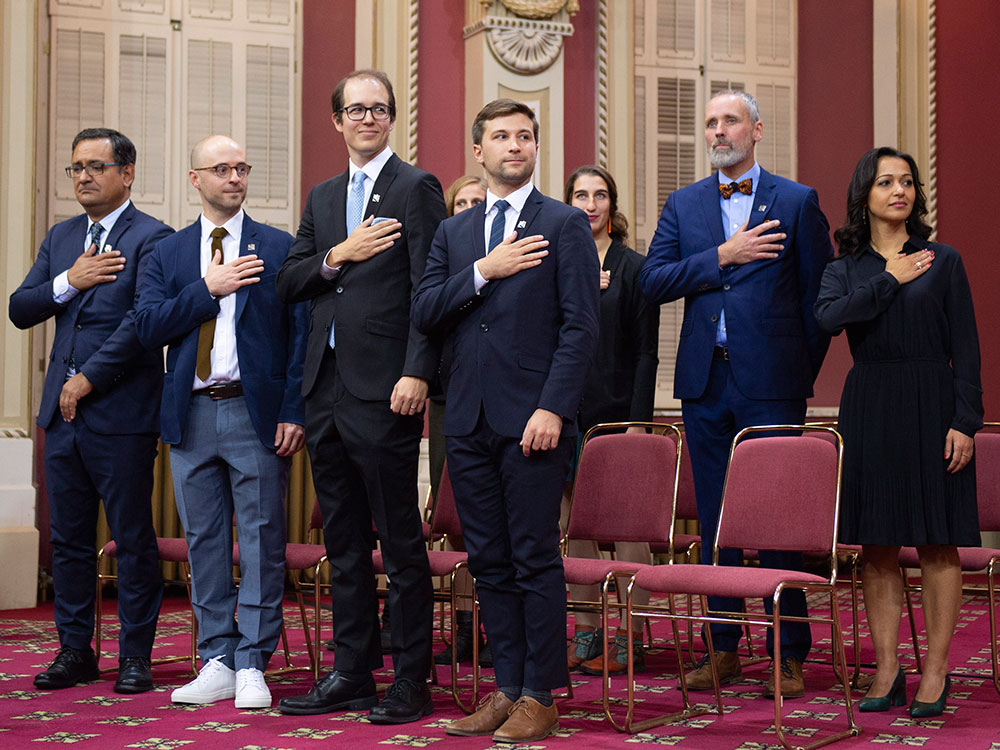I think Canadian political observers were generally pleased to see a contingent of 10 Québec solidaire members returned to the province’s National Assembly by voters on Oct. 1. Most of us are opposed to Québécois separatism, but would the country feel entirely complete without some visible rump of separatism in its cartoon-revolutionary variety? Surely it would seem as though a piece were missing from the Canadian mosaic if we didn’t have scenes like the one QS’s MNAs created on Wednesday, when they were confronted with the crushing ethical challenge of whether to take the National Assembly’s required oath to the Queen.
Would the country feel entirely complete without some visible rump of separatism in its cartoon-revolutionary variety?
Of course, when you try to pin it down, it is hard to understand exactly what the problem is. Members of the National Assembly, however they might design a government from scratch, do live in a monarchy, complete with the accompanying weird principles of legal legitimacy. The Queen is Canada’s head of state, and Quebec’s. The laws the Assembly passes are enacted in her name. As a republican who wants Quebec to depart Confederation, you might personally want to change the Canadian state — but in the meantime you are becoming part of it. Old-line Quebec nationalist parties understood this, and never had much of a problem taking the oath.
If the problem with the oath is that you regard Quebec as a conquered, humiliated nation, and the Queen of Canada as someone you are at war with, there is always the established Sinn Fein alternative: you could protest by refusing to take your seat in the Assembly. In that case there is a real deal-breaking problem with taking an oath of allegiance. You cannot take such an oath sincerely if the Queen is somebody whose authority you do not recognize, and whom you reserve the right to kill, terrorize, or defy.

But this is not Québec solidaire’s issue; they are not the FLQ. If I am oversimplifying this I am prepared to be corrected, but I cannot see how: Québec solidaire’s fundamental problem with the oath seems to be that taking it doesn’t look cool. Their solution to the problem was to go ahead and take the oath, but to do it “behind closed doors,” away from cameras and onlookers. The co-leader of QS, Manon Massé, then explained the decision this way: “We did it in private to spare you, dear friends, having to see us … (perform) an archaic and frankly disagreeable ritual.”
Such concern for the tear ducts of the people of Quebec is surely admirable, and perhaps it in no way suggests that Québec solidaire is fanciful and cultlike and creepy. But an oath doesn’t need a camera lens to make it binding. If it is really morally wrong to take such an oath, how is it preferable, or any less of an offence, to take it out of sight? This suggests that Québec solidaire would have an ethically intriguing approach to governing in the unlikely event that they were ever called upon to do it. The performance of a “disagreeable” action is fine … unless someone spots you?
The performance of a 'disagreeable' action is fine ... unless someone spots you?
Solidaire MNA Vincent Marissal made things even weirder by arguing that, “The lie would be to say something in public which we don’t believe.” A pledge of allegiance isn’t an assertion of fact: it’s a personal undertaking pertaining to future conduct. But if taking the oath to the Queen was a “lie,” how is the nature of the lie changed by the location in which you uttered it? Is the idea that one can honourably tell lies if it is done in a small enough closet? No doubt there is some nuance I am missing. It just seems strange to suggest that some action is shameful or indecent, to then actually perform that action in seclusion, and then to sprint toward the first camera lens you can find to boast about how, yes, you have just performed that action, but you hated every second of it.
And why is the monarchical nature of the Canadian state so often the occasion for such moralizing displays? Again, the position of Québec solidaire is not that the taint of monarchical theory and ceremony renders Canada and the National Assembly of Quebec in any way illegitimate. And there are definitely a lot of problems with the Canadian state and with the Assembly that would seem to be potentially higher in priority.
Is the idea that one can honourably tell lies if it is done in a small enough closet?
QS, for example, favours proportional representation in Quebec elections, but this does not seem to have prevented any of the new members from celebrating publicly when they won a wicked, compromised first-past-the-post election. Still less did it discourage them from actually occupying the seats they acquired through dubious, allegedly undemocratic FPTP accounting, and rejoicing that they had taken them.
It never does discourage anyone: in this area of disagreement, everyone is happy to accept the inherited rules of the state as a given, and to play by them in the hope of acquiring the power to alter them non-violently. But having a Queen! — oh, well, now that’s a fact of existence well worth writhing theatrically over. Apparently.



























